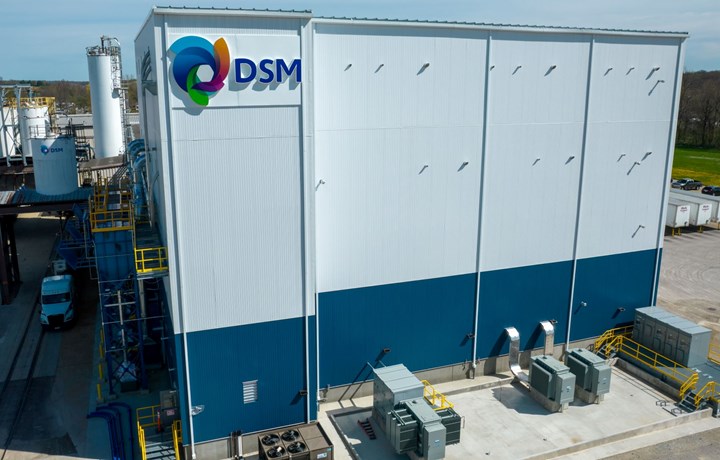DSM Expands and Upgrades Indiana Facility
Company’s new facility to ensure regional supply of high-performance engineering resins.

DSM Engineering Materials has completed its newly upgraded and expanded Evansville, Indiana, engineering thermoplastics production facility. The investment, which has resulted in significant technology - and sustainability-focused improvements, will help the company meet growing demand for next-generation high-performance polymers used in a wide range of end-applications and will help drive the shift to a low-carbon, circular economy.
The 40,000-sq.ft. facility reportedly now integrates the latest state-of-the-art production technologie, runs on 100% purchased renewable electricity, and produces the company’s Akulon nylon 6/66, Arnite PET/PBT, Arnitel TPC, EcoPaxx nylon 410, ForTii 4T/PPA and Stanyl nylon 46. The extensive enhancement and expansion of the site is being driven by increasing customer demand for advanced material solutions for vehicle electrification and supporting infrastructure, along with lightweighting technologies in multiple industries.
Enhancements to increase DSM’s capability to produce more sustainable biobased and/or recycled-based material solutions were also a key consideration when planning the project. The company has made a global commitment to producing biobased and recycled-based alternatives for its entire materials portfolio by 2030.
Together with the transition to using 100% renewable electricity, the project also includes a number of advanced energy-saving features. The expansion is a well-insulated structure that is ventilated for optimum occupant health and comfort, while emissions are scrubbed to meet stringent environmental and safety standards. Cooling is conducted with the most environmentally-friendly, non-flammable refrigerant. Variable-speed drives are used on all compounding lines to reduce energy consumption, and the optimum facility controls lead to further energy reductions.
Said Dave Miller, DSM Engineering Materials’ Evansville site director, “Investing in state-of-the-art technology provides both short- and long-term value. Enabling optimal health and comfort for all our colleagues – and increasing capacity – has positive effects we can see today, but this investment also underlines our commitment to sustainability and reducing our environmental impact in the long term. And by producing more bio- and recycled-based materials, we’ll be able to help more of our customers do the same.”
Related Content
-
How to Optimize Injection Molding of PHA and PHA/PLA Blends
Here are processing guidelines aimed at both getting the PHA resin into the process without degrading it, and reducing residence time at melt temperatures.
-
Advanced Biobased Materials Company PlantSwitch Gets Support for Commercialization
With participation from venture investment firm NexPoint Capital, PlantSwitch closes it $8M bridge financing round.
-
Part 3: The World of Molding Thermosets
Thermosets were the prevalent material in the early history of plastics, but were soon overtaken by thermoplastics in injection molding applications.






